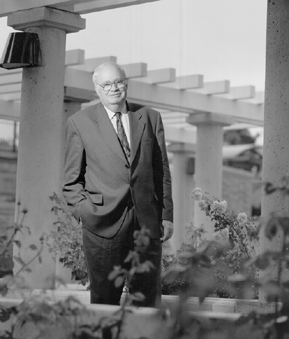 When
David Strangway steps down as UBC's 10th president at the end of this month,
he leaves a university greatly shaped by his vision and dedication.
When
David Strangway steps down as UBC's 10th president at the end of this month,
he leaves a university greatly shaped by his vision and dedication. When
David Strangway steps down as UBC's 10th president at the end of this month,
he leaves a university greatly shaped by his vision and dedication.
When
David Strangway steps down as UBC's 10th president at the end of this month,
he leaves a university greatly shaped by his vision and dedication.
Since arriving at UBC in 1985, Strangway has been the driving force behind changes that have seen UBC reach out to local and international communities while creating academic initiatives, international ties and new facilities which have secured UBC's position among North America's top universities.
The university has gained an international reputation for research and teaching, drawing students, academics and researchers from across the country and around the world to share in and contribute to UBC's wealth of expertise.
UBC's World of Opportunity Campaign raised $262 million for new programs, chairs, endowments and facilities. The campaign, which was the most successful in Canadian university history, reflects Strangway's success in moving UBC from being a cash-strapped institution in the mid-1980s to a university whose growth in areas of endowments, academic programs and new facilities is unrivaled in Canada. The university has built a $525-million endowment aimed at ensuring it remains a leader in education and research.
The introduction of new academic initiatives such as the Disability Resource Centre, the Jack Bell Chair in Schizophrenia, the Chair in Spinal Cord Research, Brenda McLean Endowment in the Creative and Performing Arts, Ronald L. Cliff Professorship in Accountancy, Peter Wall Institute for Advanced Studies, and the Dorothy Lam Chair in Special Education, to name a few, illustrate the extent to which Strangway's vision touches the university and the community beyond.
New facilities such as the Chan Centre for the Performing Arts, the Forest Sciences Centre, Walter C. Koerner Library, First Nations Longhouse, Morris and Helen Belkin Art Gallery, David Lam Management Research Centre and the Chemistry-Physics Building, have changed the physical shape of the campus and improved opportunities for teaching, research, and public education and entertainment.
The university's Official Community Plan is being developed to ensure development at UBC addresses the needs and concerns of the immediate community and the region.
Student life has been enhanced by the creation of many new scholarships as well as the construction of Green College and St. John's College, which bring together in residence graduate students from a range of disciplines. Wired in advance for new technology, the Thunderbird Student Residences were built with the needs of present and future students in mind. New scholarships ensure students have an opportunity to pursue excellence in graduate and undergraduate education at UBC. Thousands of present students and recent graduates have reaped the benefits of Strangway's efforts. Of all UBC alumni, 42 per cent received their degrees during his two six-year terms as president.
Under Strangway's leadership, UBC has built on its international relationships. Today UBC has more than 150 academic agreements with institutions in Asia, North America, Central America, South America, Europe, Africa and Australia. UBC's exchange program allows students to spend a portion of their studies in another country, gaining insight into other cultures and new ideas while serving as ambassadors for UBC and Canada. UBC has achieved a goal set in 1989 of having five per cent of undergraduate students spend a year or term studying abroad and is the most active university in Canada in this area.
After he leaves UBC, Strangway intends to provide further opportunities for advanced education to students from around the world through his plan to establish a small, private undergraduate university in B.C. UBC students--past, present and future--will continue to realize the benefits of a UBC education, and of his vision and dedication, for many years to come.
See Tributes.